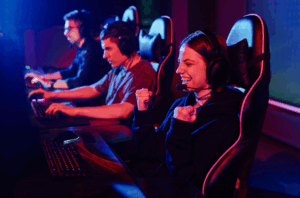The line between traditional sports, poker, and esports is blurring at lightning speed. The last decade has seen a global explosion in both online poker and professional esports, with millions tuning in to live streams, dreaming of sponsorships, and seeking a competitive edge. At the intersection of these worlds, new models for teamwork, value, and performance are emerging—models that borrow liberally from poker’s relentless grind and esports’ collective drive. If you want to understand how pro teams and coaches can learn from poker’s hard-nosed online ecosystem, just look at the rise of value-driven partnerships and resource strategies like the VIP-Grinders online poker deals now dominating the online felt.
But the story doesn’t end with simple sponsorship or promotion. Dig a little deeper, and you’ll find an evolving playbook: data-informed bankroll management, incentive-driven team cultures, risk analysis, and player psychology—all developed in the trenches of online poker and now fueling the next wave of esports evolution. Let’s explore how the lessons learned from poker’s deal-driven landscape are shaping the way teams and coaches operate, train, and win in the high-stakes world of competitive gaming.
Poker and Esports: Parallel Worlds, Shared Ambition
On the surface, online poker and esports might seem like entirely separate pursuits—one anchored in cardrooms and probability, the other played out in stadiums and digital battlegrounds. But at their core, both are arenas for skill, discipline, and the relentless pursuit of edge. Both are built on hours of practice, rapidly evolving meta-games, a thirst for strategic innovation, and the hunt for sustainable financial support.
The Value of the Deal: From Rakeback to Team Sponsorships
Consider the VIP-Grinders online poker deals—partnerships and exclusive offers that give online poker players cash-back, tournament buy-ins, coaching, and other incentives for loyalty and volume. These deals are not just about maximizing profit; they are about creating a sustainable ecosystem for grinders (dedicated, high-volume players) to turn their passion into a profession. VIP-Grinders aggregates these deals, negotiating with platforms to pass on value to their community, fostering loyalty and competitive edge.
Now compare this to the way esports organizations structure sponsorships, bonuses, and player incentives. Where poker sites offer rakeback and tailored rewards to keep players at the tables, esports teams seek out brand partnerships, performance bonuses, and collaborative content opportunities. Both models are about more than just marketing—they’re about empowering talent, building communities, and using economic incentives to fuel the grind.
Bankroll Management: Lessons for Esports Teams
Image from Unsplash
One of the core skills for any successful poker player is bankroll management—the art of balancing risk, reward, and long-term sustainability. It’s a discipline honed over millions of hands, spreadsheets, and swingy sessions, and it is as vital to success in the digital casino as it is in esports organizations.
Variance Is Real—And Predictable
Ask any poker professional, and they’ll tell you that variance (the inevitable up-and-downs of luck) is an ever-present reality. Smart players manage it through strict budgeting, selecting the right stakes, and tracking their results. This mindset is just as valuable for esports teams, where roster investments, travel costs, and tournament buy-ins can quickly spiral out of control.
- Practical Tip: Just as poker players calculate their risk-of-ruin and adjust stakes accordingly, esports teams can benefit from rigorous financial planning—building buffers for losing streaks, managing sponsorship inflows, and ensuring sustainability through lean periods.
The Team Bankroll Model
Many top online poker stables (coaching/financial backing groups) operate using a shared bankroll—pooling player winnings and losses, and distributing profits according to set percentages or achievement milestones. This allows for risk-sharing, talent development, and a longer runway for player growth. Esports organizations can mirror this by centralizing resources, re-investing winnings, and providing players with guaranteed support even during cold streaks.
Data-Driven Training and Performance Analysis
In the world of online poker, success depends on more than just gut feeling. Top grinders rely on hand history databases, game theory optimal (GTO) solvers, and session reviews to analyze their play and out-think the competition. This data-driven approach is increasingly being adopted by esports teams.
Statistical Edge and Real-Time Feedback
- Poker: Players review thousands of hands, identify leaks, and use HUDs (heads-up displays) to track opponents’ tendencies.
- Esports: Teams now use match analysis software, performance tracking, and video review to break down every match, uncover opponent patterns, and drill team coordination.
Key takeaway: In both domains, success is less about luck and more about relentlessly iterating, reviewing, and improving through data.
The importance of data analytics in performance improvement is widely recognized. According to The New York Times, top esports franchises have hired data scientists to mine every possible edge, from player reaction times to map movement heatmaps—mirroring the analytics revolution in poker.
Incentivizing the Grind: Culture, Coaching, and Motivation
Poker deals like those from VIP-Grinders are designed to reward high-volume play, consistency, and loyalty. This has led to the rise of the “grinder” culture—a community defined by hard work, self-improvement, and the collective pursuit of excellence.
Applying the Grinder Mindset to Esports
Coaches in both poker and esports have learned that motivating players goes beyond money. Recognition, community, and structured feedback are all powerful incentives. Esports teams are beginning to emulate poker stables by:
- Offering tiered bonuses and rewards for consistent training and match play.
- Providing coaching and mentorship, not just for technical skills, but also for mental health and personal development.
- Encouraging peer-to-peer learning, scrimmage reviews, and open dialogue about mistakes and improvement.
The Power of Team Deals
In both online poker and esports, team deals help share knowledge, distribute risk, and support players through tough patches. Whether it’s a poker stable funding a player’s tournament buy-in or an esports organization backing a promising rookie, these deals form the backbone of long-term success.
Risk Management and Decision-Making Under Pressure
Both online poker and esports demand lightning-fast decision-making, often under intense pressure. Coaches can take lessons from poker’s approach to managing risk and tilt (emotional reaction to losing):
- Bankroll guidelines: Stick to set limits, don’t chase losses, and always plan for variance.
- Mental game coaching: Teach players to manage frustration, avoid blame, and focus on process over results.
- Decentralized decision-making: Empower players to make quick calls based on information, not emotion—mirroring how poker teams analyze spots on the fly.
Building Communities and Networks
Poker’s online ecosystem thrives on communities: forums, Twitch streams, Discord groups, and deal aggregators like VIP-Grinders. Esports, too, is built on strong networks—content creators, fan communities, and collaborative teams.
Collaboration Over Competition
- In both worlds, knowledge sharing is key. The best players don’t just compete—they coach, create strategy content, and help others climb the ranks.
- VIP-Grinders’ model is built on collective bargaining and sharing value with its user base. Esports teams can build similar loyalty by fostering open, supportive communities.
Sponsorship, Monetization, and Sustainability
Image from Unsplash
The economics of both online poker and esports rely on constant innovation in sponsorship, monetization, and player support.
The Changing Face of Sponsorships
- Poker players negotiate direct deals (rakeback, affiliate bonuses, coaching) that can make or break their bottom line.
- Esports teams secure sponsorships from tech companies, beverage brands, and betting sites—but must structure these deals to benefit the whole team, not just the stars.
Pro Tip: The best deals are those that create win-win scenarios, providing stability for players and visibility for sponsors—just as the best VIP-Grinders online poker deals reward both player and platform.
Coaching in the New Era: Blending Poker and Esports Wisdom
As esports coaching matures, there’s growing interest in adopting proven models from poker:
- 1-on-1 mentoring: Tailored feedback for individual improvement.
- Session reviews: Collaborative analysis of matches or hands.
- Mental skills training: Borrowing from poker’s focus on mindset, resilience, and emotional control.
- Cross-disciplinary training: Encouraging players to study other games, develop broader strategy skills, and stay adaptable.
The Future: Where Poker and Esports Converge
Looking ahead, the fusion of online poker and esports will only deepen. As both industries mature, we’ll see:
- Greater use of analytics for talent identification, match preparation, and in-game strategy.
- More sophisticated sponsorship and deal structures, borrowing from poker’s affiliate-driven models.
- Ongoing cross-pollination of best practices in training, risk management, and community building.
As the playbooks merge, the next generation of teams and coaches who embrace these lessons will be best positioned for sustained success.
The world of online poker has long thrived on deals—value-packed offers that keep grinders motivated, bankrolls healthy, and communities engaged. As esports evolves, teams and coaches are taking notice, adapting the same deal-driven, data-rich, and community-focused approach to fuel the grind, reward the best, and build sustainable success. From VIP-Grinders online poker deals to cutting-edge team analytics, the lessons are clear: in a digital landscape defined by competition, collaboration, and constant innovation, those who borrow the best from every world will always find an edge.


